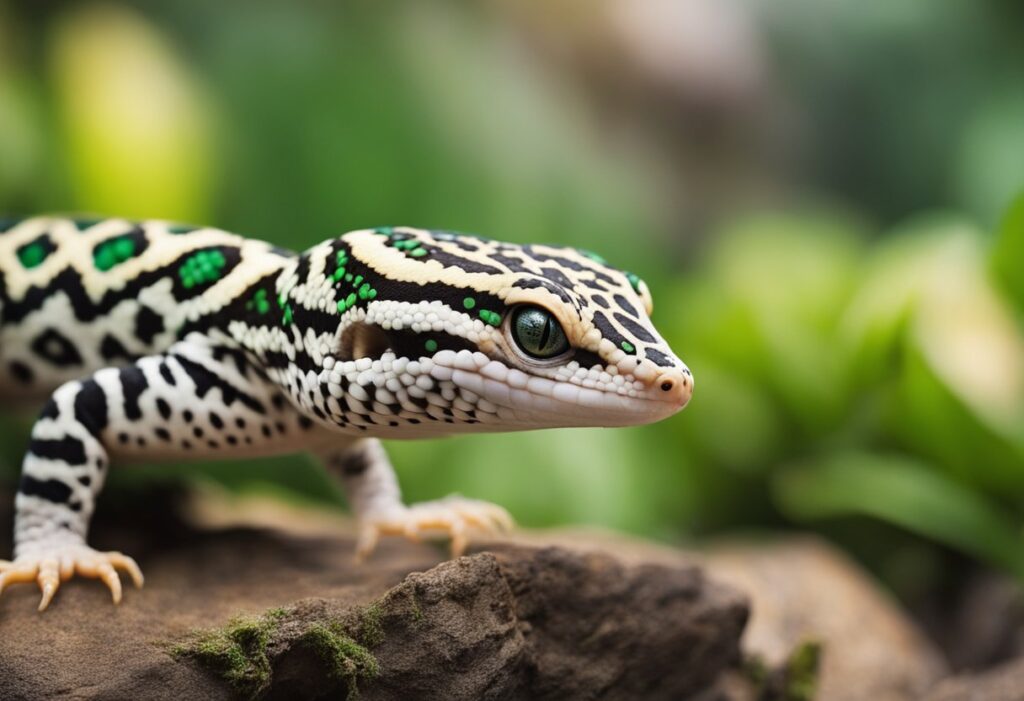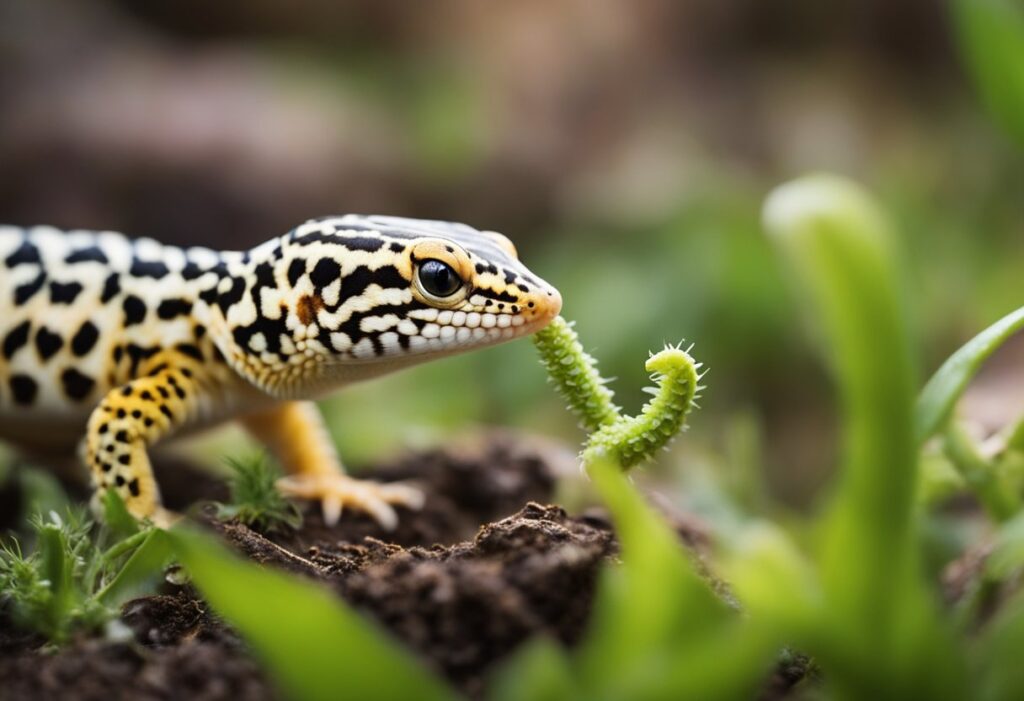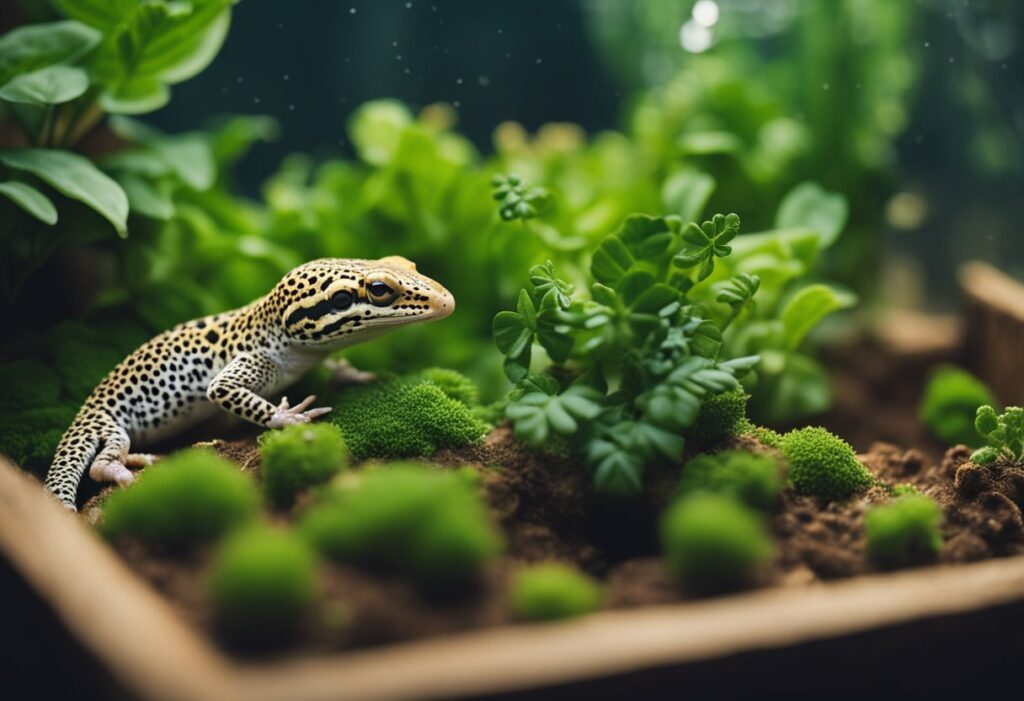Leopard geckos are popular pets among reptile enthusiasts due to their docile nature and relatively easy care requirements. As with any pet, owners want to ensure that they are providing their geckos with a balanced and nutritious diet. One question that often arises is whether or not leopard geckos can eat horn worms.

Horn worms, also known as horned caterpillars, are a type of feeder insect that is commonly used to feed reptiles. They are high in protein and low in fat, making them a potentially good choice for leopard geckos. However, it is important to consider the nutritional content of these worms and whether or not they are safe for geckos to consume. In this article, we will explore the topic of whether or not leopard geckos can eat horn worms.
Table of Contents
Leopard Gecko Dietary Basics

Leopard geckos are insectivorous reptiles that require a balanced and varied diet to maintain optimal health. In this section, we will discuss the nutritional requirements of leopard geckos, as well as their feeding frequency and amount.
Nutritional Requirements
Leopard geckos require a diet that is high in protein and low in fat. They also require a source of calcium and other essential vitamins and minerals. The following table outlines the nutritional requirements of leopard geckos:
| Nutrient | Recommended Amount |
|---|---|
| Protein | 20-25% of diet |
| Fat | Less than 10% of diet |
| Calcium | 2:1 calcium to phosphorus ratio |
| Vitamin D3 | Required for calcium absorption |
| Vitamin A | Required for vision and immune system |
Leopard geckos can obtain these nutrients from a variety of insects, including crickets, mealworms, and waxworms. It is important to feed them a variety of insects to ensure they receive all the necessary nutrients.
Feeding Frequency and Amount
Leopard geckos should be fed every 2-3 days, with the amount of food depending on their size and age. As a general rule, feed them as much as they can eat in 10-15 minutes. It is important not to overfeed them, as this can lead to obesity and other health problems.
In conclusion, leopard geckos require a balanced and varied diet that is high in protein and low in fat, with a source of calcium and other essential vitamins and minerals. They should be fed every 2-3 days, with the amount of food depending on their size and age.
Understanding Hornworms

Hornworms, also known as horned worms or tomato worms, are the larvae of the hawk or sphinx moth. These worms are commonly used as a feeder insect for reptiles and other pets due to their high nutritional value.
Nutritional Profile
Hornworms are an excellent source of nutrition for leopard geckos. They are high in protein, low in fat, and contain essential vitamins and minerals. In fact, hornworms are one of the most nutritious feeder insects available, with a calcium to phosphorus ratio of 1:1, which is ideal for leopard geckos.
Hornworms are also high in moisture, which can help prevent dehydration in leopard geckos. They are a good source of fiber, which can aid in digestion and prevent constipation. Additionally, hornworms are rich in carotenoids, which can enhance the coloration of leopard geckos.
Potential Risks
While hornworms are generally safe to feed to leopard geckos, there are some potential risks to consider. One concern is that hornworms can grow quite large, which may be difficult for smaller leopard geckos to digest. It is important to only feed appropriately sized hornworms to ensure they are not too large for your leopard gecko.
Another potential risk is that hornworms may carry parasites or disease. It is important to source hornworms from a reputable supplier and to properly gut-load and care for them before feeding them to your leopard gecko.
In conclusion, hornworms are a nutritious and beneficial feeder insect for leopard geckos. By understanding their nutritional profile and potential risks, you can safely incorporate hornworms into your leopard gecko’s diet.
Feeding Hornworms to Leopard Geckos

Hornworms are a popular feeder insect for many reptiles, including leopard geckos. They are known for their high nutritional value and soft exoskeleton, which makes them easy to digest. In this section, we will discuss the preparation and serving size of hornworms for leopard geckos, as well as the benefits of including them in their diet.
Preparation and Serving Size
Before feeding hornworms to your leopard gecko, it is important to properly prepare them. Hornworms should be kept in a well-ventilated container with a small amount of food, such as a slice of carrot or potato. This will help keep them healthy and provide them with the nutrients they need to pass on to your gecko.
When it comes to serving size, it is important to consider the age and size of your leopard gecko. For younger geckos, smaller hornworms should be offered, while larger geckos can handle larger hornworms. As a general rule of thumb, the size of the hornworm should not be larger than the width of your gecko’s head.
Benefits of Hornworms in Diet
Hornworms are a great addition to a leopard gecko’s diet because they are high in protein and low in fat. They also contain a good amount of calcium, which is important for maintaining healthy bones and teeth. Additionally, hornworms have a soft exoskeleton, which makes them easy to digest and reduces the risk of impaction.
Including hornworms in your leopard gecko’s diet can also help promote natural feeding behaviors. Hornworms are known for their wriggling movements, which can stimulate your gecko’s hunting instincts and encourage them to eat.
In conclusion, feeding hornworms to your leopard gecko can provide them with a nutritious and tasty addition to their diet. By properly preparing and serving them in the appropriate size, you can ensure your gecko receives the full benefits of this feeder insect.
Alternatives to Hornworms
If you’re looking for alternative feeder insects for your leopard gecko, there are several options that can provide a similar nutritional value to hornworms.
Common Feeder Insects
Crickets, mealworms, and dubia roaches are all common feeder insects that are readily available at most pet stores. These insects are high in protein and can provide a good source of nutrition for your leopard gecko. However, it’s important to note that some geckos may have a preference for certain insects over others, so it may take some experimentation to find the right fit for your pet.
Dietary Variety and Supplements
In addition to feeder insects, it’s important to provide your leopard gecko with a varied diet that includes a mix of fruits and vegetables. This can help ensure that your pet is getting all of the necessary vitamins and minerals they need to stay healthy. You can also consider adding a calcium supplement to your gecko’s diet to help promote strong bones and prevent metabolic bone disease.
Overall, while hornworms can be a great addition to your leopard gecko’s diet, there are plenty of other options available that can provide similar nutritional benefits. By experimenting with different feeder insects and providing a varied diet, you can help ensure that your pet is getting all of the nutrients they need to thrive.
Monitoring Your Leopard Gecko’s Health
As responsible pet owners, it is important for us to monitor our leopard gecko’s health regularly. One aspect of their health that we need to pay attention to is their diet. In this section, we will discuss the signs of a balanced diet and the warning signs of dietary issues.
Signs of a Balanced Diet
A balanced diet is crucial for the overall health and well-being of your leopard gecko. A healthy diet should consist of a variety of insects, such as crickets, mealworms, and waxworms. It is also important to include some vegetables and fruits, such as carrots and apples, in their diet.
To ensure that your leopard gecko is getting a balanced diet, you can observe their behavior and physical appearance. A healthy leopard gecko should have a good appetite, be active, and have a healthy weight. Their skin should be smooth and free from any bumps or lumps.
Warning Signs of Dietary Issues
If your leopard gecko is not getting a balanced diet, it can lead to various health issues. Some warning signs to look out for include:
- Loss of appetite
- Weight loss
- Lethargy
- Abnormal behavior, such as hiding or being inactive
- Diarrhea or constipation
- Stunted growth
If you notice any of these warning signs, it is important to consult with a veterinarian who specializes in reptiles. They can help you identify the cause of the issue and provide the necessary treatment.
In conclusion, monitoring your leopard gecko’s health is crucial for their well-being. By ensuring that they are getting a balanced diet and paying attention to any warning signs of dietary issues, you can help them live a long and healthy life.
Frequently Asked Questions
How often should leopard geckos be fed hornworms?
Leopard geckos can be fed hornworms as a treat once or twice a week. It is important to remember that hornworms should not make up the majority of their diet as they do not provide all the necessary nutrients that leopard geckos require.
Are hornworms safe for leopard geckos to eat?
Yes, hornworms are safe for leopard geckos to eat. However, it is important to ensure that the hornworms are not too large for the gecko to consume as this can lead to choking or other health issues.
What is the nutritional value of hornworms for leopard geckos?
Hornworms are a good source of protein and moisture for leopard geckos. They also contain some vitamins and minerals, but should not be relied upon as the sole source of nutrition for the gecko.
Can feeding my leopard gecko hornworms lead to any health issues?
Feeding leopard geckos hornworms in moderation should not lead to any health issues. However, feeding them too many hornworms or using them as the main source of nutrition can lead to health problems such as obesity or malnutrition.
What is the proper way to feed hornworms to leopard geckos?
Hornworms should be offered to leopard geckos in a shallow dish or on a plate. It is important to ensure that the hornworms are not too large for the gecko to consume and that they are properly hydrated.
Are there any risks associated with leopard geckos eating hornworms regularly?
Feeding leopard geckos hornworms regularly can lead to an imbalance in their diet and potentially cause health issues. It is important to offer a variety of foods and not rely solely on hornworms as a food source.





